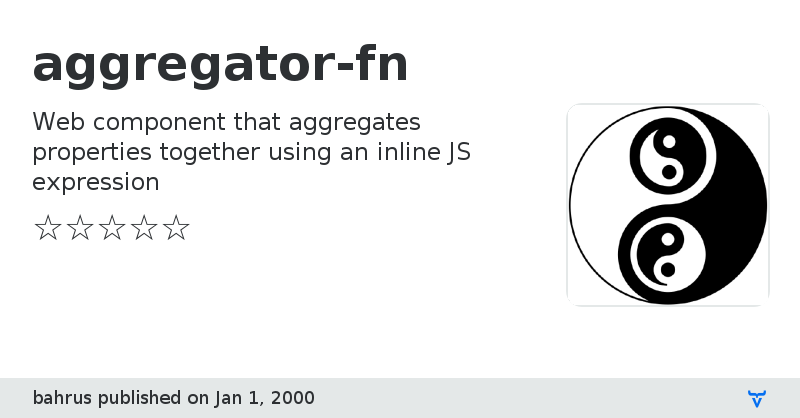aggregator-fn - Vaadin Add-on Directory
Web component that aggregates properties together using an inline JS expression

 # aggregator-fn
NB: aggregator-fn shares quite a bit of code with [litter-g](https://www.webcomponents.org/element/litter-g), as they both tackle similar problems. It would be natural to use the two together (without much additional overhead.)
\
# aggregator-fn
NB: aggregator-fn shares quite a bit of code with [litter-g](https://www.webcomponents.org/element/litter-g), as they both tackle similar problems. It would be natural to use the two together (without much additional overhead.)
\View on GitHub
aggregator-fn version 0.0.0
### Dependencies
aggregator-fn version 0.0.1
### Dependencies
* xtal-latx#0.0.34
aggregator-fn version 0.0.2
### Dependencies
* xtal-latx#0.0.34
aggregator-fn version 0.0.3
### Dependencies
* xtal-latx#0.0.34
aggregator-fn version 0.0.4
### Dependencies
* xtal-latx#0.0.34
aggregator-fn version 0.0.5
### Dependencies
* xtal-latx#0.0.34
aggregator-fn version 0.0.6
### Dependencies
* xtal-latx#0.0.34
aggregator-fn version 0.0.7
### Dependencies
* xtal-latx#0.0.34
aggregator-fn version 0.0.8
### Dependencies
* xtal-latx#0.0.41
aggregator-fn version 0.0.9
### Dependencies
* xtal-latx#0.0.41
aggregator-fn version 0.0.10
### Dependencies
* xtal-latx#0.0.41
aggregator-fn version 0.0.11
### Dependencies
* xtal-latx#0.0.47
aggregator-fn version 0.0.12
### Dependencies
* xtal-latx#0.0.47
aggregator-fn version 0.0.13
### Dependencies
* xtal-latx#0.0.76
aggregator-fn version 0.0.14
### Dependencies
* xtal-latx#0.0.76
aggregator-fn version 0.0.15
### Dependencies
* xtal-latx#0.0.77
aggregator-fn version 0.0.16
### Dependencies
* xtal-element#0.0.29
aggregator-fn version 0.0.17
### Dependencies
* xtal-element#0.0.59
* trans-render#0.0.111